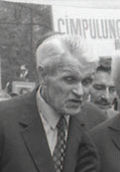Corneliu Coposu
| Corneliu Coposu | |
|---|---|
 |
|
| Founding Leader of the Christian Democratic National Peasants' Party | |
|
In office 22 December 1989 – 11 November 1995 |
|
| Leader of the Romanian Democratic Convention | |
|
In office 1991–1993 |
|
| Personal details | |
| Born |
20 May 1914 Nagyderzsida, Szilágy County, Lands of the Crown of Saint Stephen, Austria-Hungary |
| Died | 11 November 1995 (aged 81) Bucharest, Romania |
| Political party |
Romanian National Party National Peasants' Party Christian Democratic National Peasants' Party Christian Democratic International Party |
| Spouse(s) | Arlette Maniu |
| Mother | Aurelia Anceanu |
| Father | Valentin Coposu |
| Alma mater | Babeș-Bolyai University |
| Religion | Greek-Catholic |
Corneliu (Cornel) Coposu (Romanian: [korˈnelju koˈposu]; 1916–1995) was a conservative Romanian politician.
Cornel Coposu was born in Nagyderzsida, Szilágy County in that time in Austria-Hungary (now in Romania) to the Romanian Greek-Catholic archpriest Valentin Coposu (17 November 1886 - 28 July 1941) and his wife Aurelia Coposu (née Anceanu, herself the daughter of Romanian Greek-Catholic archpriest Iuliu Anceanu). Corneliu had four sisters: Cornelia (1911–1988), Doina (1922–1990), Flavia Bălescu (b. 1924), and Rodica (b. 1933).
He too was a devout member of the church and joined the Romanian National Party (PNR), a group dominated by Greek-Catholic politicians - Gheorghe Pop de Băseşti was an acquaintance of the Coposu family, and Alexandru Vaida-Voevod was a relative on Corneliu Coposu's mother's side.
After studying Law and Economy at the University of Cluj (1930–1934), he engaged in local politics with the PNR's direct successor, the National Peasants' Party (PNŢ), and worked as a lawyer. He became private secretary of Iuliu Maniu, the leader of the PNR and PNŢ, who had been a decisive factor in Transylvania's union with Romania (1918).
Coposu moved to Bucharest in 1940, when Northern Transylvania was ceded to Hungary, and, during World War II, he was an important member of the PNŢ delegation in the clandestine opposition to Ion Antonescu's regime. He established links between the movement and the United Kingdom, and was one of the politicians charged with maintaining contacts between Romanian politicians who were negotiating the country's exit from the Axis Powers and the Western Allies (an alternative kept by the Antonescu government).
...
Wikipedia
